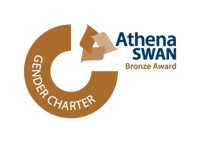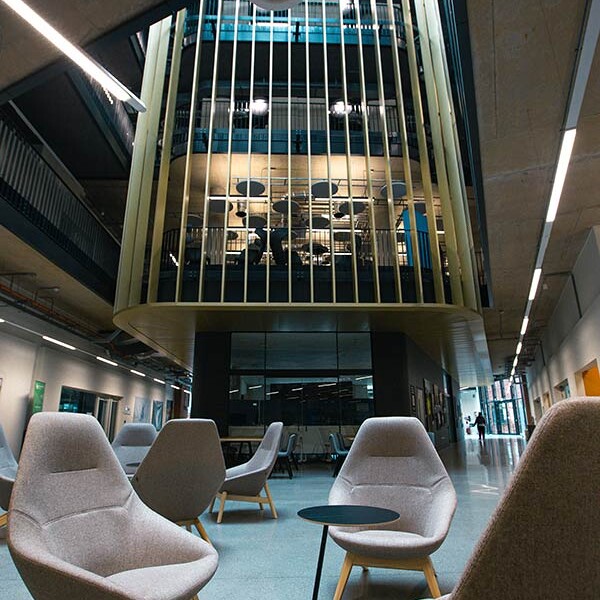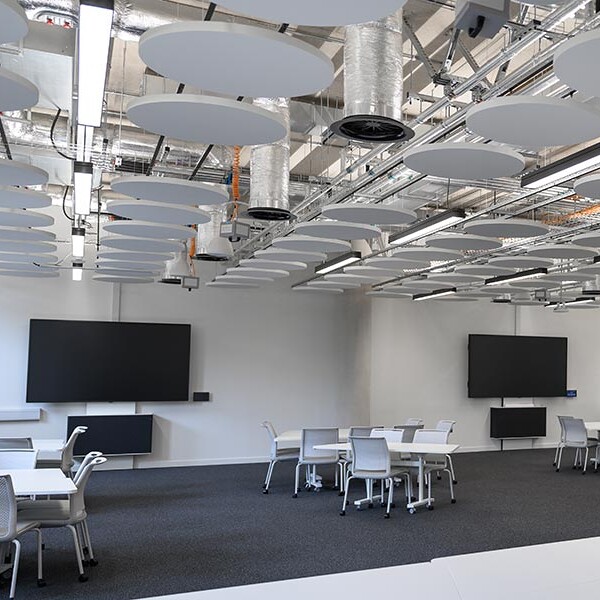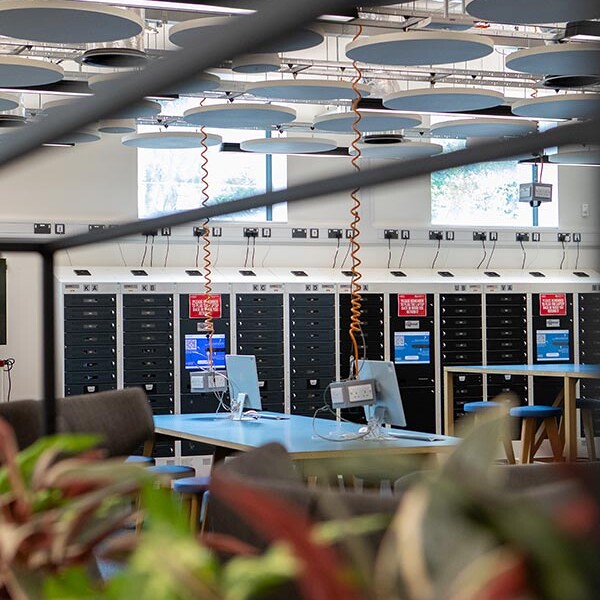
Business Information Technology with a Foundation Year - BSc (Hons)
Currently viewing course to start in 2025/26 Entry. Switch to 2026/27 Entry
The BSc (Hons) Business Information Technology (BIT) course will provide you with knowledge and skills that bridge the gap between IT and Business to drive digital transformation, innovation and growth. It aims to provide you with the skills and experience needed to communicate and collaborate effectively with business users in both technical and non-technical industries....
- Level Foundation
- Study mode Full Time
- Award BSc (Hons)
- Start date September 2025
- Fees View course fees
- Subject
- Location City Centre
This course is:
Open to International Students
Overview
I'm a third year Music Technology student. When I was looking for Music Technology courses, Birmingham City University really stood out to me. I was keen on attending a Bachelor of Science and the course really focussed on the science aspects as well as maintaining the artistic elements of music and sound production. The support of the tutors has been fantastic. The professional standard and the facilities on campus are great due to their accessibility around the clock. The easy access to studios has been extremely helpful in completing my work and keeping on top of deadlines. At BCU, there's been a heavy focus on employability and what I could do with all aspects of my degree. The university has organised the industrial mentor forum, a space where students can communicate with alumni and people within the industry. The Acoustics Special Interest Group also consisted of more bespoke talks from people within the acoustics industry about different aspects of the work and how individual companies run. This is how I developed contact with an acoustic consultancy to complete my placement year. I act as an Acoustic Technician at Dragonfly Consulting. It went so well that I'm returning upon my graduation to continue working with them. The university has given me opportunities I don't think I would have received anywhere else.
I'm a second year computer science student studying at Birmingham City University. As a Computing student, there are plenty of computer labs available. There's entire rooms filled with Cisco networking equipment, as well as laptops that can be rented out to complete your work. Several of the facilities have now moved over to STEAMhouse, which is a £70 million build that is now the new home for Computing and Digital Technology students. One of the main things for me was getting employment at the end of my university degree. And Birmingham City University offers a wealth support for moving into the work environment. The course is a very important focus and a very industry focussed as well. I've been offered roles as a student demonstrator for Python programming. I found that the best way to show that you've understood something is to be able to teach somebody else.
I'm studying Computer Networks and Security. So far, I've really enjoyed my time at BCU. I felt really included within the student community. For the past two years, I've been involved in Innovation Fest. This is an annual event that showcases student work from the faculty. A lot of employers visit this festival, which allows us to widen our professional network. Throughout my time at BCU, I've had some time to
develop a relationship with the Careers+ team and go through tailoring my CV and my cover letters with them. Because of this, I have been presented with many opportunities which they have tailored to me and my needs. Through this, I was encouraged to apply for the women in tech competition.
So it was a one week program and I was working with the team from Cyferd. It's a software company,
and I successfully won and have taken up the placement year with them as a Junior Development Lead.
I look forward to coming back and applying the skills I've learnt throughout my placement and applied them within my studies.
The BSc (Hons) Business Information Technology (BIT) course will provide you with knowledge and skills that bridge the gap between IT and Business to drive digital transformation, innovation and growth. It aims to provide you with the skills and experience needed to communicate and collaborate effectively with business users in both technical and non-technical industries. While the course contains a broad underpinning of traditional computing skills, it also focuses heavily on the highly sought-after digital transformation skills critical to keeping companies advancing in an information age.
Throughout your computing degree, you will be supported by expert teaching staff, many of whom have worked in the field of computing, are active in transformational research and are continually innovating with industry partners to achieve success.
About the Foundation Year
The Foundation Year course option enables you to study for our BSc (Hons) degree over an extended full-time duration of four years by including a Foundation Certificate (year one of four). The Foundation Certificate provides a comprehensive study course that underpins the follow-on degree. To progress to the next year of your degree, it is necessary to achieve a pass in all of the modules of the Foundation Certificate.

Introducing STEAMhouse
STEAMhouse is a centre for technology, innovation, creative thinking, prototyping and business development. Our £70 million pound building is the home for all of our Computing courses.
What's covered in this course?
This course is for you if you want to combine a highly rigorous academic qualification with real life practical work experiences to make IT work for businesses. The course enables you to think like a coder to influence organisations' design, development, and use of information systems and technology. You will also gain an in-depth understanding of how organisations can harness the data to improve decision-making.
You will be based at our City Centre Campus. You will work collaboratively with tutors, researchers and businesses, applying practice-based skills to real-life case studies and live project briefs, which will develop your problem-solving and analytical skills.
The course will help you develop a strategic mindset to address global challenges, leveraging technology to meet business needs. You will have access to virtual learning environments and networking, electronic enterprise systems and business intelligence laboratories.
Studying computing with us puts you at the heart of an exciting, innovative community. Part of your first-year assessment will involve participating in our annual Innovation Fest, where students get together to solve society's problems with sustainable solutions using creative technology.
It is not just about academic and technical knowledge – we'll also help you develop your personal and professional skills so that you can work effectively as a team member to impact many of the challenges facing modern society positively.
Accredited By
This course is accredited by:
Why Choose Us?
- Brand new facilities at STEAMhouse - This state-of-the-art building is the new home for our Computing courses. Based at our expanding City Centre Campus, this unique centre will give you access to outstanding facilities and teaching spaces, as well as opportunities to collaborate with people and businesses across multiple sectors and work on real industry-based projects.
- Industry-standard facilities - You will be based in Millennium Point, at our City Centre Campus, which has recently undergone a £6.5 million investment, including advanced software development and computer programming labs
- Optional placement year - We offer the option of a sandwich year, enabling you to undertake valuable work experience - See where our students go on placement
- Preparation for industry - You will gain experience working in multidisciplinary teams and learn how to apply your skills for industry
- Highly employable graduates - Our graduates have gone on to work at companies such as IBM Mercedes Benz and Microsoft
- Learn from industry experts - Our academic staff have a wealth of industry experience and are expertise in their field
Open Days
Join us for an Open Day where you'll be able to learn about this course in detail, chat to students, explore our campus and tour accommodation.
Next Open Day: 28 June 2025
Entry Requirements
These entry requirements apply for entry in 2025/26.
All required qualifications/grades must have been achieved and evidenced at the earliest opportunity after accepting an offer to help confirm admission and allow for on-time enrolment. This can also include other requirements, like a fee status form and relevant documents. Applicants can track their application and outstanding information requests through their BCU mySRS account.
Essential requirements
80 UCAS Tariff points. Learn more about UCAS Tariff points.
If you have a qualification that is not listed, please contact us.
Fees & How to Apply
UK students
Annual and modular tuition fees shown are applicable to the first year of study. The University reserves the right to increase fees for subsequent years of study in line with increases in inflation (capped at 5%) or to reflect changes in Government funding policies or changes agreed by Parliament. View fees for continuing students.
Award: BSc (Hons)
Starting: Sep 2025
- Mode
- Duration
- Fees
- Full Time
- 4 years
- £9,535 in 2025/26 ✱ Important note for this price
- Apply via UCAS
(↩Back to price) * The Government is proposing to increase the cap on full-time regulated tuition fees to £9,535 for 2025/26 and the University is planning on increasing fees to that maximum level once legislation is enacted. Part-time fees are charged pro-rata, where applicable.
International students
Annual and modular tuition fees shown are applicable to the first year of study. The University reserves the right to increase fees for subsequent years of study in line with increases in inflation (capped at 5%) or to reflect changes in Government funding policies or changes agreed by Parliament. View fees for continuing students.
Award: BSc (Hons)
Starting: Sep 2025
- Mode
- Duration
- Fees
- Full Time
- 4 years
- £17,690 in 2025/26
Guidance for UK students
UK students applying for most undergraduate degree courses in the UK will need to apply through UCAS.
The Universities and Colleges Admissions Service (UCAS) is a UK organisation responsible for managing applications to university and college.
Applying through UCAS
- Register with UCAS
- Login to UCAS and complete your details
- Select your course and write a personal statement
- Get a reference
- Pay your application fee and submit your application
Course in Depth
Foundation Year
In order to complete this course you must successfully complete all the following CORE modules (totalling 120 credits).
The Foundation Mathematics module provides the basic knowledge and mathematical skills which will equip the students to continue their studies to an undergraduate programme. The module will be focused on mathematics related to the field of computing. The interactive taught sessions will use fundamental mathematical in discussions to broaden understanding of the theory and practice introduced in the module. Additional support materials will be made available on the module Moodle website.
This module will provide you with an understanding of the role of digital technologies in transforming industries and sectors. It will provide you with a comprehensive introduction to core concepts of science for digital technology, and an understanding of the fundamental aspects of science essential for studying and working with digital technologies.
You will learn systems thinking methodologies to model systems supported by digital technologies, enabling you to understand different aspects of technology, and to design your own solutions. Moreover, this module will help you to develop essential academic and personal study skills necessary for success in higher education. It will provide you with basic research, academic writing, and reflection skills. These skills are vital for your transition to higher education and will enhance your learning and academic growth.
This module provides the skills necessary to design a web based application around a clear understanding of the business information requirements, a structured design of an interface and the development skills necessary to implement a solution.
This module focuses on varied technologies relating to the design and development of application to meet the information needs of a business. The module will analyse and design an application that meets current web standards.
This module, focused on emerging technologies, will provide you with an understanding of the latest advancements and trends in Computing and their applications. Through discussions, practical examples, and hands-on activities, you will gain knowledge and insights into how emerging technologies are shaping the digital landscape and the world.
During the journey within higher education, developing your independent study is an essential skill to support shaping the knowledge to become more useful and applied within practice. This module aims to provide you with necessary skills and tips that should support you to work independently within your discipline and to successfully apply project management tools and techniques to a mini project related to your subject discipline. Within the module, various tutorials will encourage the elements or creativity, innovation and thinking. The skills developed from this module acts as a foundation both towards subjects within your discipline, and more importantly, your final year’s project in Level 6. This module will be supported with 2hrs of extra module support session.
Foundations of programming aims to provide you with the fundamental principles and practice-based activities needed to begin developing software programs. The module details the anatomy of a structured software program that includes the creation of a program algorithm, a logical, simple and organised program flow and the generation of pseudo and programming code. The module uses a combination of theory and practice-based sessions designed to engage students in group and individual activities to identify the components of a software program and to apply their knowledge into hands-on software programming activities. During the module sessions you will acquire the basic skills to design and create software programs.
This module will be supported with 2hrs of extra module support session.
First Year
In order to complete this course you must successfully complete all the following CORE modules (totalling 120 credits).
This module focuses on the social and technical factors which underpin the business context of organisations and drive the need for information. You will explore how these factors influence each other and the design of business information systems. You will apply systems concepts to interrogate the dynamic relationship between people, technology, organisational structure and business process to understand the relationship between business information requirements and IT. The module establishes the systems engineering view of business systems developed throughout the rest of the programme.
Computer Systems is a core component of IOT and as such helps us with mundane but important tasks such as, monitoring our safety and security via smart sensing devices. The module presents a holistic view of how computer systems work, it also provides the underpinning knowledge required for the:
- Design of computer architecture
- Implementations of security principles
- How software interacts with hardware
- Application of electronic principles
- Use of number systems in computing
Programming is a core skill for any career within the IT industry, even if you are working in a nontechnical role (such as consultant or business analyst). As more businesses incorporate digital technologies into their operations, a basic understanding of computer programming as a minimum requirement is now essential. Future roles in IT will focus on being a creator of digital systems (rather than just a passive consumer).
This module focuses on the challenge, what are the information needs of organisations that information technology needs to support in the changing international business context? Information technology (IT) is ubiquitous in organisations capturing, creating and communicating data between internal business systems and enabling global communication between external parties such as suppliers and customers.
The module starts by focusing on two fundamental questions that underpin IT: What is information? And Why do organisations need information? The specific information that an organisation needs is then explored in this module together with the source and characteristics of the data needed to provide the information identified. Structured approaches to analysing and designing information systems are outlined, introducing different ways of modelling and communicating the business information needs.
In this module you will be given an extended induction into the academic life at university as well as start to develop key academic, professional, mathematical and cognitive skills needed to be successful at university and in a computing career. Skills such as critical thinking, mathematics, time management, and a computational approach to problem-solving will be developed through a variety of hands-on activities. This module will be supported in normal class time and during group tutorial sessions.
This first-year project allows you to develop and cultivate a creative mind-set through collaborative innovative practice, allowing you to bring together knowledge and imagination to construct a viable product. It is an opportunity to express your ideas, skills and talent to the wider community of innovative practice.
The project provides you with an opportunity to be part of a thriving community of innovators that practices connected learning. This is facilitated by putting you into inter-disciplinary project teams supported by innovation mentors, advisers and academics; culminating in you exhibiting your work to an international panel of experts.
Second Year
In order to complete this course you must successfully complete all the following CORE modules (totalling 120 credits).
Business processes re-engineering play a fundamental role in promoting products and services, improving customer satisfaction levels, and supporting operational efficiency. This module will help you understand the fundamental concepts of business process re-engineering by introducing you to multiple methodologies and process modelling techniques. The focus will be on industry-standard languages and tools, e.g., Business Process Modelling and Notation using industry standard tools such as ARIS, CAWEMO, and Bonita.
The shift in operating conditions and the ever-changing business environments has led many organisations to adopt Enterprise Systems (ES) as a mechanism to gain competitive advantage, improve productivity, and facilitate real-time decision-making.
The primary objective of implementing these systems was to address the maintenance issues of legacy systems, reduce development risk, provide timely access to information, and improve business efficiency. However, there are a number of instances, where organisations have failed to realise these benefits and end up running into costly implementation, increased maintenance, and operational challenges. This module will develop your core skills and knowledge to support organisations in the management of ES and redesigning of the business processes...
This module aims to provide a comprehensive introduction to a vitally important core IT topic (database technology) found in almost every IT installation in the world. The module will provide theoretical and practical knowledge and skills in developing a database system, including reflecting database systems development from understanding the needs through designing and developing database systems. This module allows students to investigate ways to create a robust, secure database that meets the organisation's needs, which complement other skills and knowledge gained from other modules on the course. In addition, the module introduces the student to transferable skills in database design, implementation, optimisation, security and database administration. Once mastered, these database skills will provide a firm understanding of designing and managing databases in organisations.
In this module you will gain the underpinning knowledge for developing software applications. The focus is on software development, including requirements gathering, software design, programming and testing. All of the topics covered in the module will form the basis of the design, implementation and evaluation of a functional software application.
In this module will you will focus on combining theoretical concepts around user experience design with practical “hands-on” approaches widely used in industry and academia to create effective interactive experiences. Current technology developments involve humans using information centred applications, both physically and cognitively. With the advent of ubiquitous computing and connected products, digitalisation has enabled information architectures that are not solely focused in software based applications, but also in tangible computing devices. In this context, you will learn about the user-centred design process that places a core emphasis on designing products and applications for “people”. In particular, you will learn techniques for gathering and understanding a target audience’s requirements, the importance of universal design and accessibility, methods for undertaking rapid prototyping, core principles around aesthetics and visual design, and a range of techniques for designing, running, and analysing user evaluations.
This module forms part of the Research and Enterprise strand that runs through each programme curriculum from level 4 to 7. It builds on the core concepts, which were introduced to you at level 4 in the practice based computing related modules and the underpinning role innovation plays in this.
Final Year
In order to complete this course you must successfully complete all the following CORE modules (totalling 120 credits).
This module enables you to gain an understanding of the processes, scope and role when providing guidance or advice in a professional consulting capacity. It will also assist you if you join a larger organisation with the aspiration to become a leader and manager. The module provides awareness on the wider consulting profession and practice, the consulting role in computing and the management of client relationships. The focus will be to analyse and evaluate the frameworks, processes and techniques applied by computing consultants, managers and leaders.
The module focuses on applying analytical methods for processing the data generated by organisations to gain insights that inform decisions. The module will introduce you to business intelligence techniques and methodologies to describe, predict and inform decision-making in all aspects of the business. You will have hands-on experience applying tools and techniques, providing knowledge and an analytical mindset to interpret the results generated from the analysis undertaken.
This module focuses on the challenge, how can information systems align with business strategies to enable organisations to successfully sustain and develop their positions in the global digital economy? Information, information systems (IS) and information technology (IT) are valuable organisational resources that must be effectively managed to help the organisation achieve its objectives.
Strategic alignment directs the development of IS and the deployment of IT to provide continued support to the attainment of business objectives. This module explores how to formulate a robust IS strategy that enables an organisation to harness the value of its information resource to support attainment of the organisation's strategy
The rapidly changing nature of business operations and working conditions means that the ability to respond digitally to business needs is vitally important. Every company must deal with necessary, but repetitive business processes that consume time and energy. Automation is a critical factor for successful businesses, but both the time and monetary cost to develop automated solutions can often be too great. Low code/no-code development platforms help developers and businesses move faster when creating custom business applications. As such, it is estimated that, of the number of new enterprise applications developed by 2025, 70% will be developed via ‘low code’ or ‘no code’ technologies (Garner, 2021).
The purpose of the module is to enable you to undertake a sustained, in-depth and research-informed project exploring an area that is of personal interest to you. In agreement with your supervisor, you will decide upon your topic which will take the form of a practical outcome (artefact) with accompanying contextual material. The main consideration when choosing your topic is that it must be aligned to the programme you are studying, and you should consider the relevance of this topic to your future academic or professional development.
Download course specification
Download nowYou will experience a wide variety of subjects and methods, all reinforced by practical, hands-on learning activities. You will be encouraged to undertake self-directed study, enhancing your organisational and management skills.
Our teaching philosophy revolves around you both learning by doing and transferring acquired knowledge to others by teaching others. Activities will occur both individually and in teams, with tutors providing leadership and mentoring aimed at supporting your transition into independent learners. In this partnership we will be encouraging you to become proactive, so that you can develop your confidence to undertake a range of progressively complex and challenging tasks.
You will demonstrate acquisition of these work-related skills by using an assessment strategy that is reflective of industry needs. Assessments will be varied and include knowledge and skills tests. However, the focus will predominantly be on the use of coursework. Here you will learn to present your ideas and showcase your work to a variety of audiences, both as members of a team or individually. You will also learn to present your ideas through written pieces of work for example by formulating proposals and reports.
Professional Accreditation
Some of the course modules will provide the taught element of professional accreditations like SAS (business intelligence), Oracle, Microsoft, Cisco and CompTIA. This preparation will allow you to extend the learning outside the classroom, to a possible qualification.
Student stories

Jaspreet Phagura
Our students also use their skills to develop commercial applications. Jaspreet Phagura launched a new application that allowed users to buy tickets to local events via their mobile phone.
The ‘iRaver’ application was designed to save students time when searching for upcoming events in their local area. Once registered, users can book tickets for events in a few simple steps, use the ‘call a taxi’ function, which instantly identifies local taxi companies in the surrounding area, and identify public houses, bars and nightclubs in a specified area via its ‘near me’ function.

Jenny Powell
Dedicated student Jenny Powell has surprised herself with her own success. She didn’t expect to find herself at university – now she’s planning her postgraduate studies! Jenny’s “thoroughly enjoying” her time here, making use of the great support on offer to give her studies everything she’s got.
Jenny’s aiming high – and putting in the hard work to achieve her goals, alongside 21 hours a week of part-time work. "I am shocked, as I wouldn't have expected to get here when I was at school, “ she admits. Now, she’s aiming for a first. “I love learning and studying,” she says. “I would like to get a job at the end as a business analyst or web development.”
Trips and Visits
We continually organise student trips to various external events and organisations. In the past, trips have been organised for our students to careers events, to help engage our students with their future employers and increase their employability.
Trips have included a visit to ‘The Gadget Show’, a television series which focuses on consumer technology which is broadcast on Channel 5, and Bletchley Park, the home of British code breaking and the birthplace of modern IT.
International Opportunities
You are able to apply to undertake part of your studies abroad, allowing you to experience life and studying in another country at one of our exchange partner universities.
This offers a unique opportunity to enhance your CV and experience new cultures.

Athena Swan Bronze Award
We have successfully secured the Athena SWAN Departmental Bronze Award recognising a commitment to gender equality.
The Athena Swan Charter is a framework which is used across the globe to support and transform gender equality within higher education (HE) and research.
Employability
Enhancing your employability skills
You will be given the practical, technical and academic skills that will help you to stand out when you step onto the job ladder.
When you study with us you’ll learn all the key aspects of business information technology that will help you to get a job, from underlying concepts and principles to the relationship between theory and practice.
You’ll use advanced software development and computer programming labs, as well as dedicated facilities for systems analysis, database design and development, e-commerce, and business intelligence.
You will also benefit from our strong links with companies such as SAS, SAP, Oracle, Microsoft, Samsung and IBM, which keep your course relevant, real-life, and respected by employers.
We ensure that you’ll graduate with the skills, creativity and experience needed to succeed in employment.
Placements
We aim to have you employer-ready by the time you graduate and as part of this commitment we encourage you to further enhance your career prospects by including an industrial placement in your course.
You will do your placement after the second year of study, which will extend the duration of your course to four years.
Thanks to our excellent partnerships and strong relationships with industry, you could join the ranks of our students who have gained exceptionally high quality work experience at companies including Cisco Systems, IBM, 3M, and Airbus.
Placements provide the workplace experience that many employers look for and give you an invaluable opportunity to develop your practical expertise, earn money and try out a potential career path.
The Faculty's placements team will give you every support throughout the placement process.
Facilities & Staff
Our Facilities
We are constantly investing in our estate and are currently in the process of spending £260 million on new learning facilities. This course will be taught at Millennium Point at the City Centre Campus.
The course is supported with a wide range of cutting-edge facilities in the City Centre Campus. We have a state-of-the-art computer games technology lab which contains high-performance PCs, Sony PlayStation development kits and a range of industry standard software including Unity, Unreal and a suite of professional Microsoft development tools.
We also have many open access areas where students can study together and even hire out laptops for use in these spaces and others within the university.
Within the University there are many internationally recognised research teams giving you the opportunity to collaborate with them on exciting interdisciplinary projects.
Computer networking
The laboratories are well-equipped for all our computer networking courses, as well as specialist areas for practical work such as voice-over internet protocol (VoIP), forensic and ethical hacking technologies, wireless and mobile technologies and radio frequency identification technologies to name but a few.
Software development and computer programming
There are a number of open access, software development and computer programming laboratories that can be used to develop systems and programmes, including database management systems such as MySQL, to name but a few.
Systems laboratories
Our embedded systems laboratories are used to develop real-time systems, such as specialist hardware training and development resources, and industrial-standard software development and simulation tools. These include microcontroller software and robotics design and development, to name but a few.
Electronic systems
To underpin the basic principles of electronic systems, we have a well-equipped laboratory of general and specialist test and measurement kits, including powered prototyping development boards, dual power supplies, frequency generators and counters and digital multi-meters to name but a few.
Forensic computing
Our successful development of forensic computing has led to a specialist forensics laboratory that is fully equipped with essential hardware and software for this sensitive area of study. The laboratory includes high-spec PCs with built-in multi interface Tableau write blockers, EnCase and FTK computer forensic software and steganography detection and analysis software, to name but a few.
Our staff
Professor Sharon Cox
Professor of Computing
Professor Sharon Cox’s research in information systems and information management is based on her industrial experience. While developing the corporate data model at Jaguar Cars, Sharon was offered a fully funded studentship from Aston University to embark on doctoral research. Her research focused on developing models to explore the information...
More about SharonDr Jagdev Bhogal
Associate Professor of Computing
Jagdev is an experienced lecturer whose main teaching area is Database Systems. She is the Course Leader for MSc Business Intelligence and the MSc Big Data Analytics courses. Jagdev has published conference and journal papers on relational/object/nosql database systems, ontologies, text mining and cloud computing...
More about JagdevFiaz Afsar
Programme Leader / Senior Lecturer (Business Information Technology)
Fiaz has worked in the HE for past 20 years. He initially spent 7 years working in industry as a Technology Transfer Consultant providing IT/Network based solutions to SME’s within West Midlands. He then moved to Birmingham City University teaching network technologies/ infrastructure and more recently Business Systems Solutions and Enterprise...
More about FiazDr Gerald Feldman
Senior Lecturer in Information Systems
Gerald is a senior lecturer, researcher and Information Systems practitioner at Birmingham City University. He has practical and industrial experience gained working on managing, designing, and implementing information systems. His research focuses on business systems analysis, technological change and process optimisation and maturity.
More about GeraldDr Waldo Cervantes-Solis
Senior Lecturer
Dr Waldo Cervantes has over 20 years of experience in tech, industry, and academia. He has led and collaborated in a variety of projects ranging from start-up development, Internet of Things, Energy, Transport and Enterprise. He holds a PhD in Engineering from the University of Birmingham and is currently a Lecturer in Distributed at...
More about WaldoDr Martyn Ratcliffe
Senior Lecturer
Martyn graduated with a physics degree and started his career at British Aerospace. After several changes of department and the completion of an M.Sc. in Digital Systems he settled in the software department, designing real-time software for weapon systems.
More about MartynDr Michael Bickerton
Course Leader
Dr Michael Bickerton is Course Leader on the BSc (Hons) Digital Film Production course. Michael has been producing and teaching film for over twenty-five years. He has international production experience and has taught on prestigious courses (such as the UK Film Council’s 'Introduction to Screenwriting').
More about Michael










